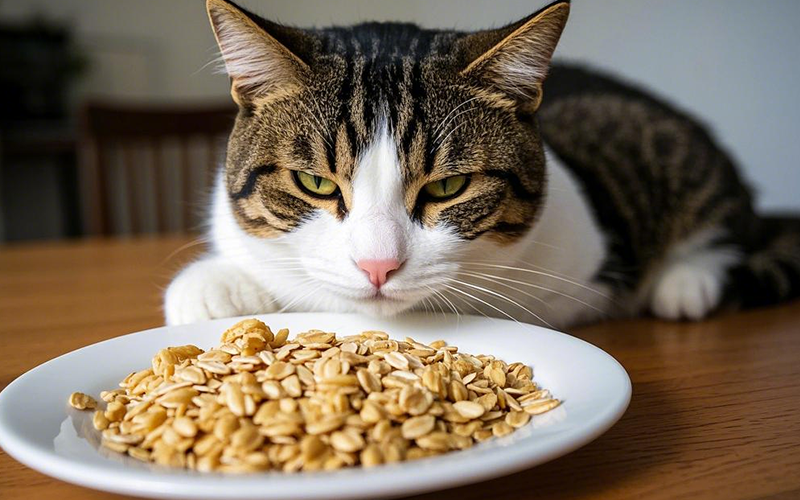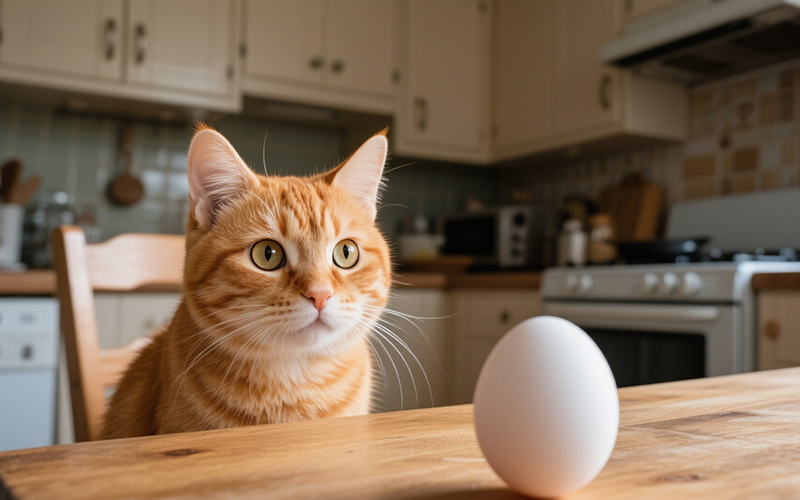Can Cats Eat Oats? Understanding the Safety and Benefits of Oats for Cats
- 13 Mar 2025 11:36
As a pet owner, it's common to wonder whether certain human foods, like oats, are safe for your furry friend. Oats are a popular and nutritious food for humans, often consumed in the form of oatmeal or added to baked goods. But can cats eat oats? Are they a healthy option for your pet, or should they be avoided?
Let’s explore whether oats are safe for cats, and if so, how you can incorporate them into your pet's diet in a healthy way.

What Are Oats Made Of? 🥣
Oats are a type of whole grain that is rich in fiber, vitamins, and minerals. They are commonly used in breakfast foods like oatmeal, granola, and granola bars. Some key nutritional components of oats include:
Fiber: Oats are a good source of soluble fiber, which can help regulate digestion.
Vitamins: Oats contain B-vitamins, including thiamine and folate.
Minerals: Oats provide important minerals such as iron, magnesium, and zinc.
While these are beneficial for humans, cats are obligate carnivores, meaning their diet should primarily consist of animal-based proteins and fats. They don't require grains like oats for nutrition, but they may still enjoy them as an occasional treat.
Can Cats Eat Oats? 🐱
Yes, cats can eat oats in moderation, but oats should not be a regular part of their diet. Here’s why:
Oats Are Not Toxic to Cats 🐾: Oats are not toxic to cats, so it’s generally safe to give your pet a small amount. However, they are not a natural part of a cat’s diet, and they don’t provide the essential nutrients that cats need, such as protein and fats from animal sources.
Rich in Fiber 🌾: The fiber in oats can offer some digestive benefits, but too much fiber can cause gas, bloating, or diarrhea in cats. It’s essential to give oats in small amounts and monitor your cat’s reaction.
No Nutritional Necessity for Cats 🥩: While oats have some nutritional value for humans, cats do not need carbohydrates or grains in their diet. Animal-based proteins and fats are crucial for their health, and grains like oats don’t provide any of these essential nutrients.
Potential Risks of Giving Oats to Cats 🚨
Although oats are generally safe for cats in small quantities, there are some risks and considerations to keep in mind:
Digestive Upset 💩: Cats' digestive systems are designed for protein, not grains. If your cat eats too many oats, they might experience digestive issues like vomiting, diarrhea, or constipation. Always start with a small amount and watch for any signs of discomfort.
Excess Calories 🍽️: Oats can be calorie-dense, and if your cat eats too many, it could lead to weight gain. Cats’ caloric needs are much lower than humans, so too much food—especially grains—can contribute to obesity.
Allergens or Sensitivities ⚠️: Some cats may be allergic or sensitive to certain grains, including oats. If your cat shows signs of itching, swelling, or other allergic reactions after eating oats, discontinue offering them and consult a veterinarian.
Toxic Additives in Processed Oats 🏷️: If you're offering store-bought oatmeal or oats with added flavorings or sugar, it’s important to check the ingredients. Artificial sweeteners like xylitol or other additives may be harmful to cats. Plain oats without any added sugar or flavoring are the safest option.
How to Safely Feed Oats to Your Cat 🍽️
If you’d like to offer oats to your cat as a treat, here are some tips for doing so safely:
Use Plain, Cooked Oats 🍲: Make sure the oats are plain and cooked, without added sugar, salt, or flavorings. Uncooked oats can be difficult for cats to digest and may cause discomfort.
Offer Small Amounts 🐾: Oats should be a small part of your cat’s diet, not a main food source. A small spoonful of cooked oats is a safe starting point. Observe your cat to see how they react to this new food.
Monitor for Digestive Issues 👀: After offering oats, keep an eye on your cat for any signs of digestive upset. If your cat shows any discomfort, such as vomiting or diarrhea, stop feeding oats and consult a veterinarian.
Occasional Treat, Not a Staple 🎉: Oats should be an occasional treat rather than a regular part of your cat’s diet. Cats thrive on a protein-rich diet, so make sure the majority of their meals are made up of high-quality animal-based proteins.
Healthier Alternatives to Oats for Cats 🥩🍗
If you’re looking for healthier treat options for your cat, there are several alternatives that provide more nutritional value for your pet:
Cooked chicken or turkey 🍗: A protein-rich snack that’s much more beneficial for your cat’s health than oats.
Cat treats 🐾: There are many specially formulated treats for cats that are designed to provide the necessary nutrients.
Small pieces of fish 🐟: Many cats love fish, and it’s a great source of protein and omega-3 fatty acids.
Catnip 🌿: A fun and safe treat that many cats enjoy, stimulating them in a natural way.
PettureX: Your Pet’s Health Assistant 🐾💻
If you're ever uncertain about whether a food is safe for your cat or if you need advice on your pet's diet, PettureX is a valuable resource. This AI-powered pet health assistant offers 24/7 consultations, helping you make informed decisions to keep your pet healthy and happy.
Conclusion: Can Cats Eat Oats? 🌾
In conclusion, cats can eat oats in moderation, but they are not a necessary or ideal part of your cat’s diet. While oats are not toxic, they don’t provide the nutrients that cats need, and too many can lead to digestive upset or weight gain. Always offer oats as an occasional treat and make sure they are plain, cooked oats with no added sugar, salt, or flavorings.
For optimal feline nutrition, stick to protein-rich treats like chicken, turkey, or fish, and consult with your veterinarian for any dietary questions.
Related

Can Cats Eat Egg Yolk Raw? A Vet's In-Depth Guide to Feline Nutrition & Safety
- 10 Jun 2025
Can Cats Eat Dog Kibble? Unpacking the Nutritional Mismatch!
- 29 May 2025
Can Cats Eat Deli Turkey? Slicing Through the Facts for Your Feline!
- 29 May 2025
Can Cats Eat Deer Meat? Exploring Venison for Your Feline!
- 28 May 2025
Can Cats Eat Corned Beef? Unpacking This Salty Human Delicacy!
- 28 May 2025
Can Cats Eat Cooked Rice? The Grain Truth for Your Feline Friend!
- 27 May 2025
Can Cats Eat Cornbread? A Crumb of Truth for Curious Cat Owners!
- 27 May 2025
Can Cats Eat Cooked Meat? Sizzling Facts for Your Feline's Feast!
- 26 May 2025
Can Cats Eat Chili? Spicing Up the Truth About This Human Dish!
- 26 May 2025
Can Cats Eat Chicken Eggs? Cracking the Code on This Feline Food Query!
- 24 May 2025
